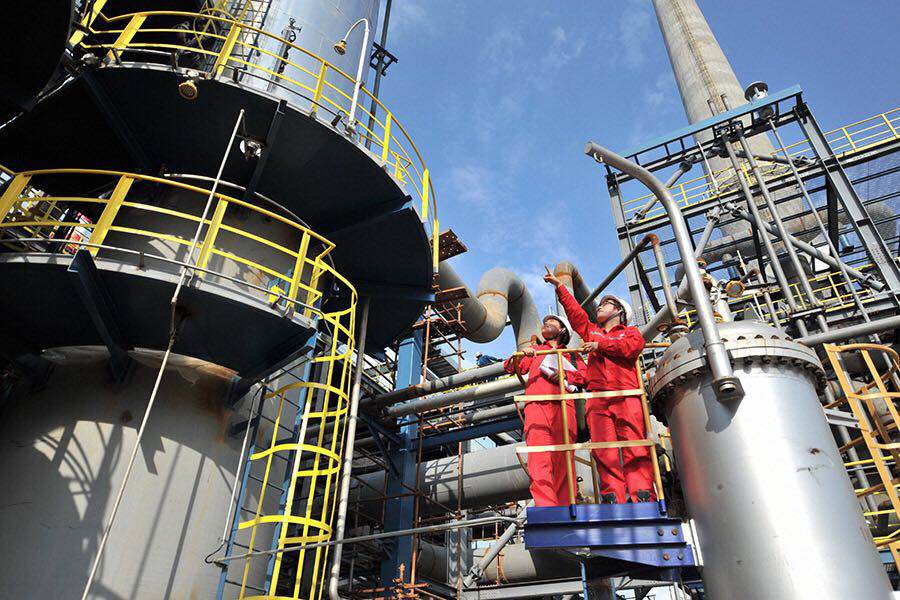


Sinopec employees check natural gas equipment in Guangyuan, Sichuan province, in June. [Photo by Hu Qingming/for China Daily]
A research group from ShanghaiTech University has developed a novel method of using light to transform methane, ethane and other gases into valuable liquid products.
A paper describing the technique - Selective Functionalization of Methane, Ethane, and Higher Alkanes by Cerium Photocatalysis - was published in Science recently.
"The finding provides a new, sustainable and mild catalytic platform for natural gas utilization, and will lead to more applications in the energy and chemical industries," said Zuo Zhiwei, one of the authors of the paper. Zuo is an assistant professor at ShanghaiTech University's physical science and technology school.
Methane, the main component of natural gas, is viewed as a clean fuel and inexpensive feedstock in the chemical community. However, given its natural state as a gas, it is difficult to transport economically.
David MacMillan, a member of the National Academy of Sciences in the United States, commented that potential uses of the new method in sectors such as pharmaceuticals, agrochemicals and fine chemicals are clearly evident.
"This is a remarkable paper that will be widely influential on a global scale," MacMillan said.
Alexander van der Made and Sander Van Bavel, scientists at Future Energy Technologies of Shell Global Solutions, said the paper "presents a key first step toward a green route to activate alkanes under mild conditions".
Usually achieved with metal catalysts, current processes rely on rare and expensive metals, such as platinum and palladium, and often require high temperatures to provide energy, Zuo said.
"We wondered if we could develop a more affordable and sustainable catalytic platform using light energy and an economical catalyst," Zuo said.
The group tried cerium, a metallic element that accounts for more than half the rare earth in China. Its low cost and unique properties were attractive, although it is not usually regarded as a potential catalyst for organic reactions.
After 2,202 trials, the researchers developed an efficient platform for the catalytic conversion of methane and other gaseous alkanes under LED irradiation at room temperature using abundant and inexpensive cerium salts as photocatalysts.

 Award-winning photos show poverty reduction achievements in NE China's Jilin province
Award-winning photos show poverty reduction achievements in NE China's Jilin province People dance to greet advent of New Year in Ameiqituo Town, Guizhou
People dance to greet advent of New Year in Ameiqituo Town, Guizhou Fire brigade in Shanghai holds group wedding
Fire brigade in Shanghai holds group wedding Tourists enjoy ice sculptures in Datan Town, north China
Tourists enjoy ice sculptures in Datan Town, north China Sunset scenery of Dayan Pagoda in Xi'an
Sunset scenery of Dayan Pagoda in Xi'an Tourists have fun at scenic spot in Nanlong Town, NW China
Tourists have fun at scenic spot in Nanlong Town, NW China Harbin attracts tourists by making best use of ice in winter
Harbin attracts tourists by making best use of ice in winter In pics: FIS Alpine Ski Women's World Cup Slalom
In pics: FIS Alpine Ski Women's World Cup Slalom Black-necked cranes rest at reservoir in Lhunzhub County, Lhasa
Black-necked cranes rest at reservoir in Lhunzhub County, Lhasa China's FAST telescope will be available to foreign scientists in April
China's FAST telescope will be available to foreign scientists in April